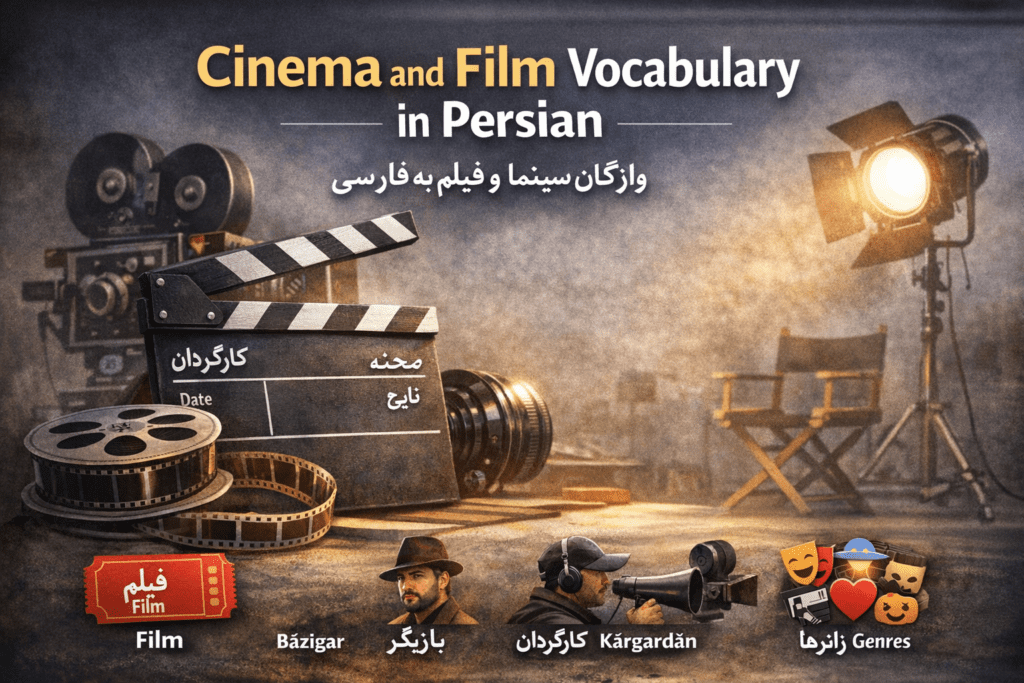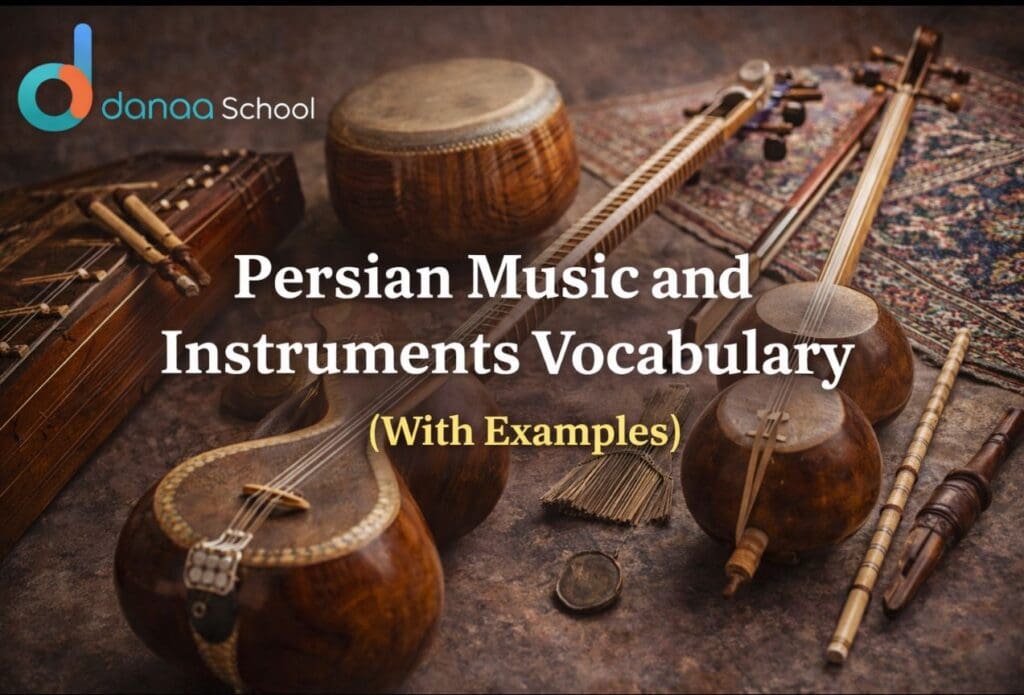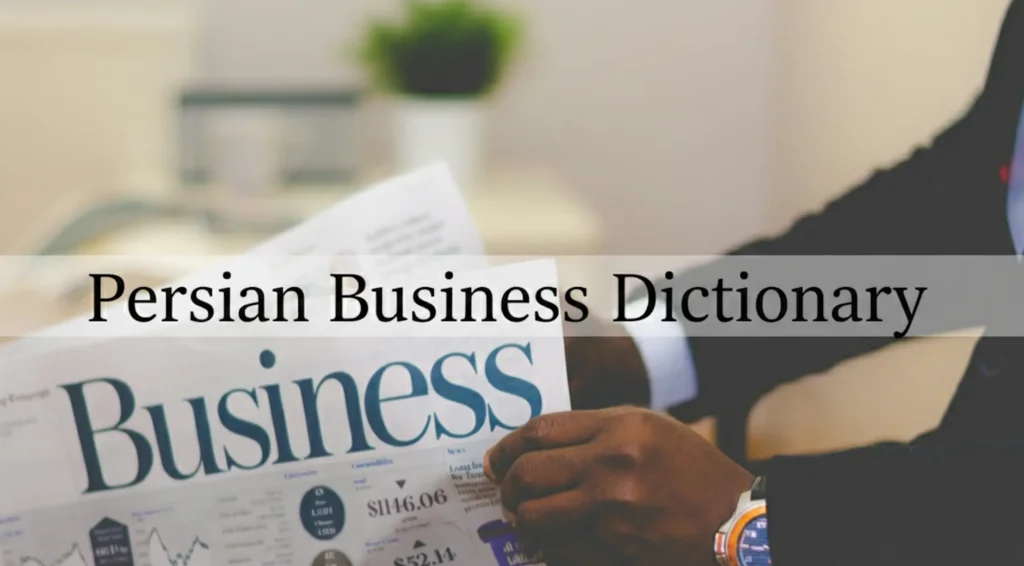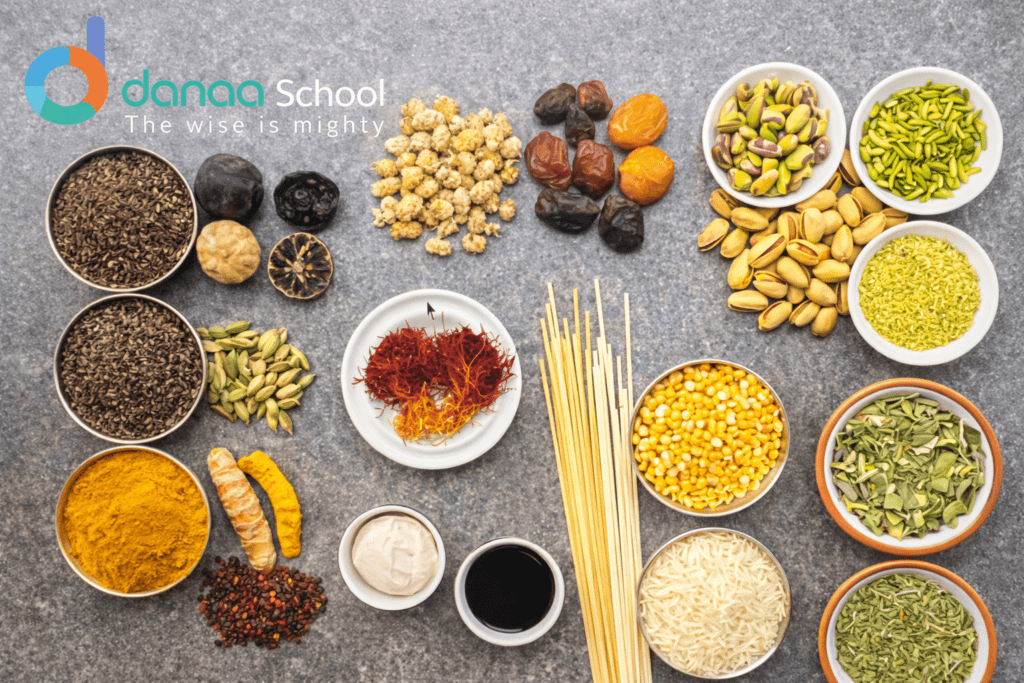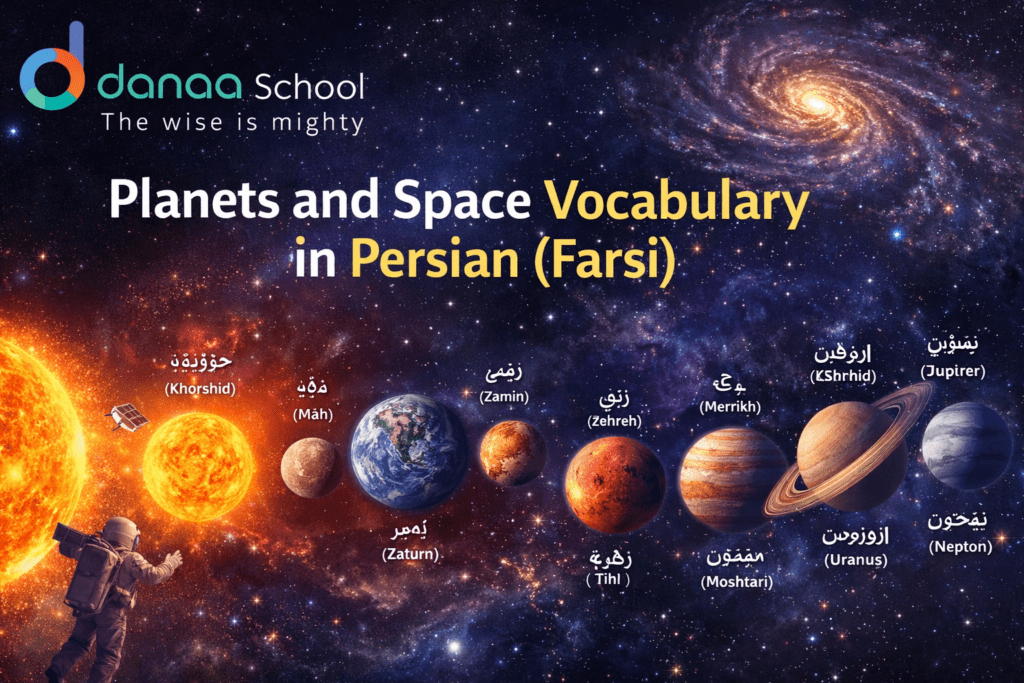10 Beautiful Words in Farsi (Persian) You’ll Fall in Love With
The Persian language, also known as Farsi, is a treasure trove of poetic expression, rich history, and deep cultural heritage. With its flowing script and musical tones, Persian has enchanted poets, scholars, and language lovers for centuries.
These beautiful words in Farsi (Persian) are perfect for beginners who want to learn Persian vocabulary fast and connect emotionally with the language.
For those looking to learn Farsi, each new word opens a door to a world filled with beauty, wisdom, and meaning. In this guide, we explore 10 beautiful Farsi words and show how Danaa School can help you master Persian naturally.
10 Beautiful Farsi Words (Quick List)
| Farsi | Transliteration | Meaning | Pronunciation | Common Use |
|---|---|---|---|---|
| گل | Gol | Flower | gol | Poetry / endearment |
| مهر | Mehr | Love, kindness | mehr | Literary / names |
| دل | Del | Heart | del | Very common |
| خوش | Khosh | Happy, pleasant | khosh | Daily phrases |
| نور | Noor | Light | noor | Spiritual / names |
| آرام | Aram | Calm, peace | aa-raam | Everyday & poetic |
| شیرین | Shirin | Sweet | shee-reen | Literature / names |
| امید | Omid | Hope | o-meed | Very common |
| زیبا | Ziba | Beautiful | zee-baa | Compliments |
| عشق | Eshq | Deep love | eshgh | Poetry / emotion |
Tip: Scroll down for examples and cultural usage of each word.
Gol (گل) – The Essence of Beauty
Gol means flower, but in Persian it symbolizes beauty, delicacy, and love. It’s often used as a term of endearment and appears frequently in poetry.
Mehr (مهر) – Love & Kindness
Mehr represents affection, compassion, and warmth. It reflects the heart of Persian hospitality and emotional connection.
Del (دل) – Heart & Soul
Del goes beyond “heart” and refers to one’s emotional core. Expressions like az تهِ del mean “from the bottom of my heart.”
Khosh (خوش) – Happiness
Khosh means happy or pleasant and appears in many everyday phrases such as khosh amadid (welcome).
Noor (نور) – Light & Wisdom
Noor symbolizes light, clarity, and spiritual insight. It is widely used in names and religious expressions.
Aram (آرام) – Peace & Calm
Aram describes tranquility and inner peace, often used to express emotional balance.
Shirin (شیرین) – Sweetness
Shirin means sweet in taste and personality, famously tied to Persian love stories.
Omid (امید) – Hope
Omid is the word for hope and optimism, deeply rooted in Persian culture and daily speech.
Ziba (زیبا) – Beauty
Ziba is used to describe beauty in people, art, and nature with elegance.
Eshq (عشق) – Deep Love
Eshq refers to profound, passionate love—the kind celebrated in Persian poetry.
Want to remember these words faster? Learning them in real conversations makes all the difference.
Learn Farsi with Danaa School
If these beautiful Persian words inspired you, Danaa School offers a structured and engaging way to learn Farsi. From beginner vocabulary to real-life conversation, you’ll learn Persian naturally and confidently.
Sometimes, learning a language starts with just one beautiful word.
Find Your Ideal Teacher
At Danaa School, you can choose your Farsi tutor from a selection of qualified and experienced teachers. Begin an exceptional journey into the world of Persian language!
Book Your Trial Lesson
How Do You Say Beautiful in Farsi?
While “زیبا” is a universally accepted term for “beautiful” in Farsi, Persian offers several other captivating expressions, each suited for different situations. Let’s take a look at some of the most widely used terms.
- زیبا (Zibā)
The most straightforward and common word for beautiful in Farsi is “زیبا” (zibā). This term applies broadly to both people and objects. Whether you’re describing a stunning landscape, a beautiful work of art, or someone’s physical appearance, “zibā” works well in both casual and formal situations.
- خوشگل (Khoshgel)
“خوشگل” (khoshgel) is a more informal and affectionate way to say “beautiful.” It is often used to describe someone as pretty or cute, making it a favorite among friends, family, and close companions. This word has a charming, light-hearted tone and is commonly heard in daily conversations.
- قشنگ (Ghashang)
“قشنگ” (ghashang) is another popular term, especially used to describe something visually pleasing. While “ghashang” is somewhat similar to “zibā,” it often feels more down-to-earth and is used more frequently in everyday speech. For example, if you see a nice dress, a beautifully decorated room, or an attractive person, you might say, “خیلی قشنگه” (it’s very beautiful).
- دلربا (Delrobā)
This poetic term translates to “heart-stealing” or “captivating.” “دلربا” (delrobā) is used in more literary or romantic contexts to describe someone or something that is not just beautiful but mesmerizing. It’s ideal for expressing admiration for beauty that leaves a lasting emotional impact, making it a favorite in Persian poetry and romantic settings.
- جذاب (Jazāb)
“جذاب” (jazāb) goes beyond physical beauty and often refers to someone who is both beautiful and charming. This word implies attractiveness with a magnetic personality or allure. It’s akin to the English word “attractive,” suggesting that the person or object in question possesses a beauty that draws people in.
How to Pronounce “Beautiful” in Persian
Farsi pronunciation can be tricky, especially for English speakers. Here’s a breakdown of the words we mentioned:
- Zibâ: Pronounced as zee-bah (with the “a” sounding like “ah” in “father”). The emphasis is on the second syllable.
- Khoshgel: Pronounced as khosh-gel. The “kh” sound is guttural, similar to the “ch” sound in the Scottish word “loch.”
- Ghashang: Pronounced ghash-ang. The “gh” is a deep, throaty sound, common in many Persian words.
You can find Farsi pronunciation guides or language learning resources online, but practicing with a native speaker or tutor like those at Danaa School will help you nail the sounds.
Beauty and Compliments in Iranian Culture
Compliments are an integral part of Iranian social interaction. In Farsi, the concept of beauty goes beyond physical appearance—it can also refer to someone’s personality, speech, or even the atmosphere they create.
In Iranian culture, it’s common to be generous with compliments. For example, you might hear phrases like:
- خوشگل (Khoshgel) – Meaning “pretty” or “cute,” used in everyday settings.
- ماه (Mah) – Meaning “moon,” but metaphorically used to describe someone as radiant or beautiful.
If you compliment someone by saying تو ماهی (To mâhi), it means “You are like the moon,” which is a very endearing compliment!
Understanding the cultural significance of beauty will help you speak the language and deepen your connections with native speakers.
How to Say “You Are Beautiful” in Persian
When learning Farsi, it’s essential to understand the different contexts in which these words are used. Here are a few key tips:
1. Use the right word for the right situation
Words like zibâ and khoshgel can be used interchangeably when describing physical beauty, but if you’re praising something deeper, like a person’s kindness, you might want to use words like مهربان (mehrabân) meaning “kind.”
2. Be aware of tone and formality
In formal settings, it’s better to use zibâ instead of khoshgel or ghashang. However, in casual or familiar contexts, all three are fine.
3. Practice with phrases
Try these expressions to impress your Farsi-speaking friends:
- چقدر زیبایی! (Cheqadr zibâyi!) – “How beautiful you are!”
- تو خیلی خوشگلی (To kheili khoshgeli) – “You’re very pretty.”
FAQs
How difficult is it to learn Farsi?
Farsi can be moderately challenging for English speakers due to its unique script and grammatical structures, but with consistent practice and a good teacher, it becomes more accessible.
What’s the best way to start learning Farsi?
Start with the alphabet and basic phrases, and practice daily. Enrolling in a structured course like Danaa School can accelerate your progress.
Can Persian words have multiple meanings?
Yes, many Persian words are rich with multiple meanings depending on context, which is part of what makes the language so poetic.
Why is Persian considered a poetic language?
Persian has a long history of poetry, and its vocabulary is filled with words that express deep emotions, nature, and spirituality.
What are the benefits of learning Farsi?
Learning Farsi opens doors to understanding Persian culture, history, and literature, and allows for deeper connections with Persian-speaking communities.
How can I improve my Farsi pronunciation?
Listening to native speakers, practicing with audio lessons, and getting feedback from a tutor like those at Danaa School can help you improve your pronunciation.
Conclusion
In conclusion, learning Farsi is more than acquiring a new language—it’s an invitation to experience the rich tapestry of Persian culture, history, and poetic beauty. Each word you learn brings you closer to understanding the depth and elegance of this ancient language, connecting you to centuries of art, philosophy, and tradition.
Whether you’re drawn by its melodic tones or the profound meanings behind its words, mastering Farsi promises a journey of inspiration and discovery.
With Danaa School, you have the opportunity to explore this enchanting language in a structured and culturally immersive way. Start your journey today, and let the beauty of Farsi transform the way you see the world.
Want to Learn Farsi at Danaa School?
Here are the best resources for you!




